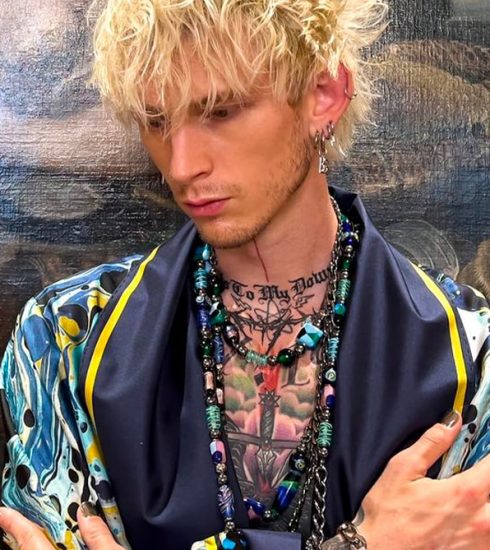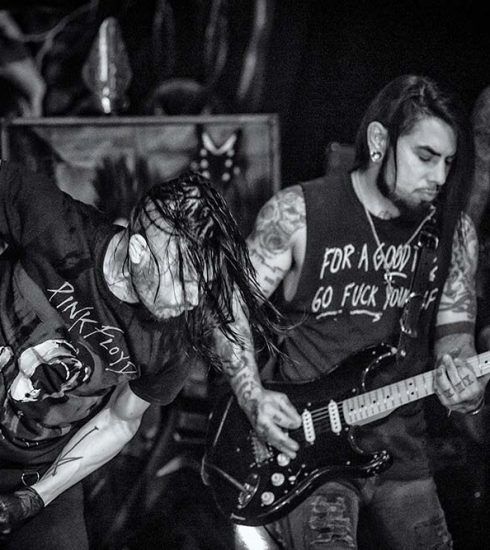It’s a very tumultuous time in the band Queensrÿche’s long and storied history. The founding members are in the midst of a lawsuit to determine who owns the rights to the band’s trademarks. It’s a sad chapter in the annals of the originators of progressive metal. After thirty years of making some of the most forward thinking songs in all of metal, and showing countless new bands how it’s done, it was time for a parting of the ways.
All the legal wrangling aside, Queensrÿche is still alive and kicking, even if it’s in the form of two separate bands for now. The Queensrÿche headed by Geoff Tate consists of one time Queensrÿche members, and long time collaborators, Randy Gane and Kelly Grey. Joining them are Rudy Sarzo of Quiet Riot and Whitesnake fame along with his brother Robert, and Simon Wright, former drummer for AC/DC and Dio. These guys are the real deal. They are professional musicians with plenty of experience and a lot of miles on the road. They know how to put on a show and you will get everything you pay for and more when seeing them live. The band is currently in the midst of a national tour and Geoff was kind enough to sit down and talk to us.
David Medeiros: First off I’d like to say that it’s an honour to get to talk to you today. Thank You so much for taking the time out of your busy schedule. You are such an icon of metal music. Queensrÿche basically invented the genre of Progressive Metal. How does it feel to look back on all you’ve accomplished to this point in your career?
Geoff Tate: I don’t typically do that. I’ve never been one to look back. I’ve always tried to look at what I’m going to do or what I am at the moment doing. It is very humbling and flattering to know that people appreciate the music and that’s all I could really ask for.
DM: I don’t want to get too much into the ongoing legal battles that you are going through, but how are you holding up? How difficult has it been to have such a private matter played out in such a public Forum
GT: Good, I can’t really talk too much about it because we are in the settlement negotiations right now. I will say it was a very difficult experience. The last two years have been very difficult to deal with, but, I’m getting past that now, and looking forward to the future and whatever that holds.
DM : Metal fans are the most ardent in rock, do you feel it has been difficult for some fans who feel like they have to take sides between you and the other original Queensryche members?
GT: Well I would question the act of taking sides. It’s difficult if not impossible to take sides in a situation like this because you don’t know what the real story is unless you’re there. You are relying on “he said, she said”, internet rumors, and bloggers which are incredibly inaccurate and in many cases made-up. I would advise people to concentrate and appreciate the music, which is really what it’s all about.
DM : You put together a sensational band and released Frequency Unknown last year. It came out to some mixed reviews and you took the awesome and unprecedented step of offering fans a remixed copy of the album if they weren’t satisfied with the original mixes. How did you decide to do that?
GT: Well I think that with that album, it came out at an unfortunately controversial time in the history of Queensryche. I think the album was overshadowed by the controversy with the breakup. It is what it is and we move on from there. As far as mixed reviews go, every album that Queensryche has ever released has been to mixed reviews. That’s just been the name of the game with this band. I’ve always tried to push the envelope with the music because that to me is the definition of progressive, to always keep trying to experience something new through the music. When you do things like that, if that’s your mindset, you will always get mixed reviews because it flies the finger in the face of conformity. I got used to mixed reviews years ago with our first release. To me, music is a very personal journey for people. Not only for me, the artist who makes the music, but for every individual listener also. You can’t expect as a writer that you are going to connect with everybody, because we are all experiencing life in our own orbit. We all have individual experiences that are different from everyone elses. The conclusion I’ve come to is that I do what I do. I experience my life and I write about it, then I share it with the world and the world will do with it as the world does.
DM: Speaking of what an awesome group of musicians you are currently working with, among them Rudy Sarzo of Quiet Riot and Simon Wright of AC/DC and Dio. How did this all-star group of musicians come together?
GT: Randy, Kelly, and I go back almost 40 years. Simon, I’d met on the AC/DC tour that Queensryche opened up for back in 1986. We hit it off and have kept in contact. Rudy, I met when Queensrÿche opened for Quiet Riot back in 1983. We became friends then and remain friend to this day. It’s all guys that I’ve known for years and years and that have a shared musical sensibility. They are also guys that I felt I could hang out with, and be comfortable with. It’s a very important aspect about being in a band that you have to be able to have some common ground with the people you share this with. You can’t feel that you’re always on guard. When the time came to put together a band, I simply picked up the phone and asked them what they were doing.
DM: I see Sass Jordan listed on your website as being a member of the band. Will she be teaming up with you on this tour?
GT: Yes, She’s coming out on the road with us. We are performing the entire Operation Mindcrime album and Sass will be singing the part of Sister Mary.
DM: I can not believe that it’s been 25 years since Operation Mindcrime came out. I still remember buying it on cassette! You are doing an anniversary tour right now. What can we expect?
GT: It’s a very special album for a lot of people. It’s a real joy to play it in it’s entirety. It’s also a favorite album amongst everyone in the band and we are all so excited to be part of the presentation of it. There is a great camaraderie amongst this group of people and it comes across live very well.
DM: Now that you are older, do you find that you have to prepare or take care of your voice any differently?
GT: Not consciously, but I think that over time your priorities become different. I don’t have quite as much energy as I did as a young man. I still go out and have plenty of energy for the show, but I have noticed that since hitting my fifties, I have slowed down just a little bit. Not enough to worry me, but getting out of bed after being on the road for a 5 or 6 day run, sleeping on the bus, Yea, I’m a little sore.
DM: You have been so successful and you have so many other interests and ventures, is it difficult at this point in your life to go back out on the road?
GT: Not at all. I absolutely love it. Everybody in the band always teases me by calling me the old road dog, because that’s what I am. I love traveling, I love riding on the bus, I love truck stops, I like truck stop food, I love the atmosphere of the truck stop. I love pulling up to the gig early in the morning and walking around the city and having a coffee at Starbucks. I’m just built for that, it’s what I’ve been doing all my life and I honestly don’t know anything else.
DM: Queensrÿche was the “Sound of Seattle” before there was any such thing as Grunge. You still make your home in the Pacific Northwest. Do you think keeping to your roots has allowed you the stability to continue to create such great art for such an extended period of time?
GT: Wow, That’s a really good question. I hadn’t really thought about it from that angle before. Honestly, I’ve always been sort of a nomad. Most of my life I’ve spent on the road traveling the world. Typically when I was home, that location would change every couple of years. I never stayed in the same house for very long. I did put down roots when my kids were young so that they had a steady, constant lifestyle. Because I was gone so much, I wanted them to have a good solid place where they felt comfortable and happy. My wife and I bought a house in the country, outside of Seattle, and we’ve lived here for 17 or 18 years. This is the longest that I’ve ever lived in one place in my life and my wife as well. We joke about it because we were both so nomadic. All our kids are now moving out. We only have one daughter left at home. I think when she gets out of school that maybe we’ll pack up and move someplace just to kind of satisfy our need to wander. As a writer, I think that I am influenced by my surroundings, but the way that my life is, that I am gone for 8 or 9 months out of the year, I don’t necessarily think that actually being there is what inspires me. My body is there, but my mind is usually somewhere else. I think there probably is a feeling that I have deep down that I have recently become conscious of, that security, that this is my home.
DM: I wanted to touch on your life outside of music a bit. You are a noted wine enthusiast and even own your own brand. Please tell me about that.
GT: I have a wine brand called “Insania”. It’s a very fun endeavour. It started out as a hobby and a passion, and then evolved into a business. I really enjoy it. I enjoy collecting wine from around the world in my travels. I just happen to live in Washington state and we have a very active, developing wine industry here. It’s a wonderful business to be a part of, filled with amazing, creative people. Everyone is focused on maximizing their creative exploration in the area of wine development. It’s inspiring to be around and I thoroughly enjoy it.
DM: Thank you so much again for your time. It’s truly appreciated. Good luck on the upcoming leg of your tour, I know how much I personally am looking forward to your New York show. I’m sure our readers are just as excited, and we’ll be seeing you out on the road!
GT: It’s been great talking with you, and I’ll see you at the show.





